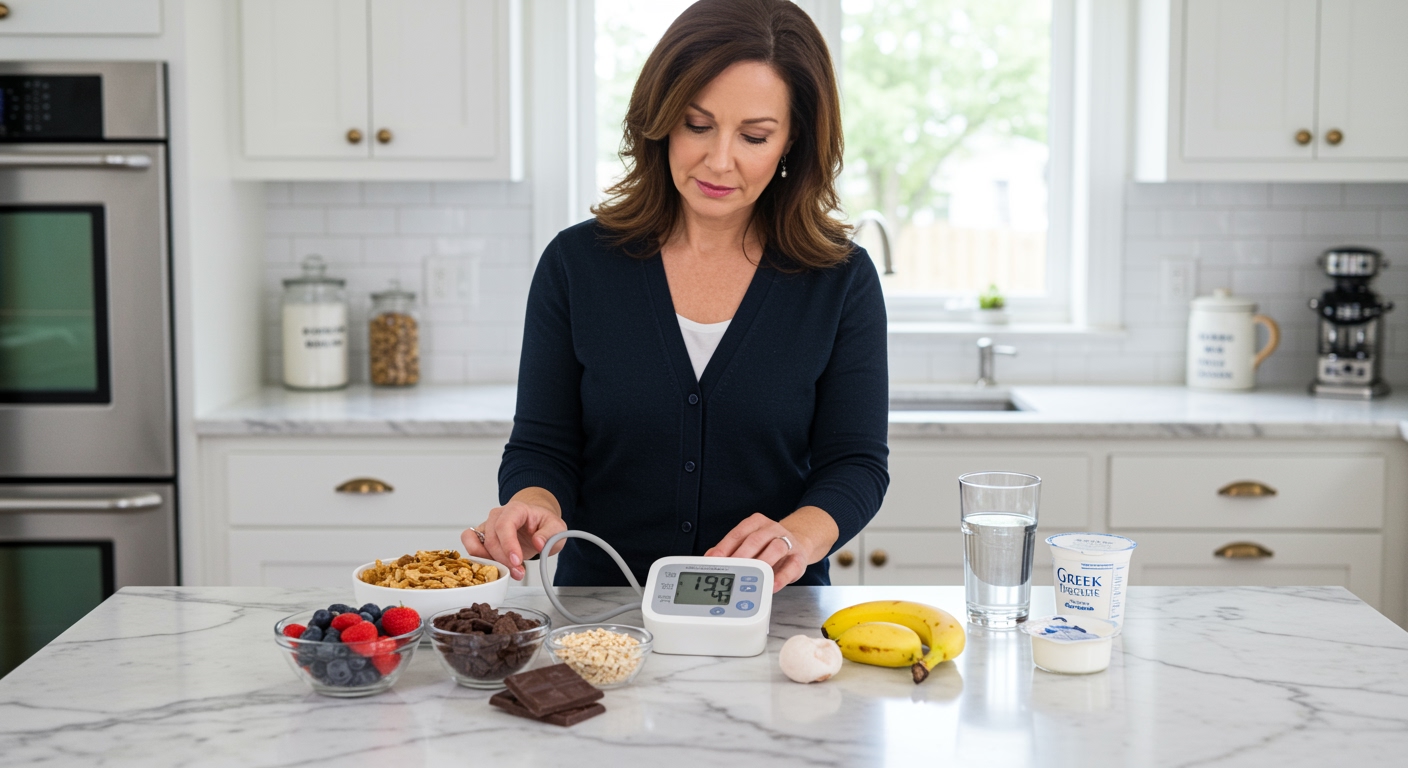✪ Key Takeaway: Hypertensive patients can enjoy desserts in moderation by choosing options low in sodium and added sugars while monitoring portions.
Introduction
Your doctor just told you that your blood pressure is too high, and suddenly every dessert looks like a weapon aimed at your heart.
You might be wondering if you need to say goodbye to all sweet treats forever, especially when well-meaning friends and family members keep telling you that sugar is now your enemy.
Hi, I’m Abdur, your nutrition coach, and today I’m going to explain why the complete elimination of desserts might not be the best approach for managing your high blood pressure.
What Actually Happens When You Eat Desserts With High Blood Pressure?
The relationship between desserts and blood pressure is more complex than most people realize.
When you consume added sugars in large amounts, your body experiences a cascade of reactions that can temporarily raise your blood pressure.
Your pancreas releases insulin to manage the sugar spike, which can cause your kidneys to retain more sodium and water.
This extra fluid increases the volume of blood flowing through your vessels, creating more pressure against your arterial walls.
However, the temporary nature of this response means that occasional dessert consumption does not automatically doom your blood pressure management efforts.
The real problem occurs when high-sugar desserts become a daily habit rather than an occasional treat.
✪ Fact: A single dessert typically raises blood pressure for only 2-4 hours before returning to baseline levels.
Which Desserts Are Actually Dangerous For Your Blood Pressure?
Not all desserts pose the same risk to your cardiovascular health.
The most problematic desserts are those that combine high sodium content with excessive added sugars.
Store-bought cookies, cakes, and pastries often contain surprising amounts of sodium as a preservative and flavor enhancer.
Ice cream and frozen desserts can be particularly troublesome because they often contain both high sugar and significant sodium levels.
Desserts with artificial sweeteners might seem safer, but some studies suggest that certain artificial sweeteners can interfere with your body’s glucose metabolism.
The portion size matters more than the specific dessert type in most cases.
A small piece of regular chocolate cake will likely have less impact on your blood pressure than a large serving of supposedly healthier alternatives.
✪ Pro Tip: Always check the sodium content on dessert labels as it can range from 50mg to over 400mg per serving.
Can You Make Blood Pressure Friendly Desserts At Home?
Creating desserts that satisfy your sweet tooth without spiking your blood pressure is entirely possible with smart ingredient choices.
Fresh fruits naturally contain potassium, which helps counteract sodium’s blood pressure-raising effects.
Dark chocolate with at least 70% cocoa content contains flavonoids that may actually help improve blood vessel function.
Greek yogurt with berries provides protein that slows sugar absorption and prevents rapid blood pressure spikes.
Oat-based desserts offer soluble fiber that can help lower both cholesterol and blood pressure over time.
Homemade desserts allow you to control both the sodium and sugar content while adding heart-healthy ingredients like nuts and seeds.
The key is replacing refined sugars with natural sweeteners like dates, applesauce, or mashed bananas that provide additional nutrients.
✪ Note: Homemade desserts typically contain 60-80% less sodium than store-bought versions.
How Often Can You Safely Enjoy Desserts With High Blood Pressure?
The frequency of dessert consumption matters more than complete avoidance for long-term blood pressure management.
Most cardiologists recommend limiting desserts to 2-3 times per week for people with well-controlled hypertension.
Your individual response to sugar varies based on your medication, overall diet, and how well your blood pressure is currently controlled.
People taking certain blood pressure medications may experience more pronounced blood sugar fluctuations after eating desserts.
The timing of dessert consumption can also influence its impact on your cardiovascular system.
Eating desserts after a balanced meal with protein and fiber helps slow sugar absorption and minimizes blood pressure spikes.
Regular blood pressure monitoring becomes crucial when you include desserts in your diet to track your individual response patterns.
✪ Pro Tip: Keep a food and blood pressure diary for two weeks to identify your personal dessert tolerance levels.
What Happens When You Completely Eliminate All Desserts?
Complete dessert elimination often backfires and can actually harm your blood pressure management efforts.
Psychological stress from extreme dietary restrictions can trigger the release of cortisol and adrenaline, hormones that directly raise blood pressure.
Many people experience intense cravings that lead to binge eating episodes, causing more dramatic blood pressure spikes than moderate consumption would.
Social isolation often occurs when you cannot participate in celebrations or family gatherings that involve shared desserts.
This isolation creates additional stress that can elevate your blood pressure more than the occasional dessert ever would.
Sustainable blood pressure management requires a balanced approach that includes foods you enjoy in appropriate portions.
The all-or-nothing mentality often leads to complete diet abandonment when people inevitably break their strict rules.
✪ Fact: Studies show that people with moderate dessert intake have better long-term blood pressure control than those who completely restrict sweets.
The Bottom Line
Hypertensive patients do not need to eliminate all desserts from their lives to maintain healthy blood pressure levels.
Smart choices beat complete restriction every time when it comes to sustainable health management.
I would love to hear about your experiences with managing dessert cravings while controlling your blood pressure, so please share your thoughts or questions in the comments below.
References
At NutritionCrown, we use quality and credible sources to ensure our content is accurate and trustworthy. Below are the sources referenced in creating this article:
- Vinmec: Does Eating Sweets Raise Blood Pressure?
- PMC: Sugar and Cardiovascular Disease
- PubMed: Added Sugar Intake and Cardiovascular Diseases
- Harvard Health: The Sweet Danger of Sugar





